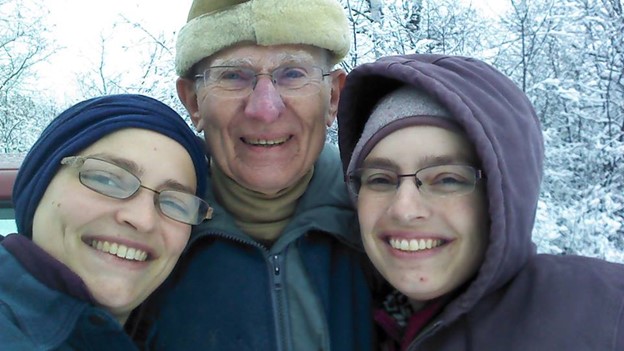Why We Gather

Early this morning the roads were slick with ice and Mom and Steve rolled into the farm. 4:00 am—not going to be much sleep this night before chore time set in. But in the car was the precious cargo picked up at the Minneapolis airport. Kara was back from her horse ranch adventure in Arizona, and Mom’s cousin Brian was visiting from Texas. And we’ll be seeing Grandma and Grandpa Christmas day.
But why all the extra effort and distance travel to be together this time of year? What does it tell us about the human condition, especially in the darkest time of the year?
Winter is a good time for reading on the farm. We seem to cram in as many good books as possible, including reading many of them aloud to each other while we stoke the woodstove, knit, weave, or otherwise enjoy the evening after chore-time. We recently finished Loneliness: Human Nature and the Need for Social Connection by John Cacioppo and William Patrick.
Drawing on two decades of accumulated research, brain scans, and social experiments, Cacioppo and Patrick peel the onion on the human social need for meaningful relationships and interactions, calling the species “obligatorily gregarious.”
On the simple level, this makes sense and is mirrored in the animal world. In the face of large predators, sticking together is safer. Herd animals know this well. One duck or one lamb alone with no other animal interaction is horrifically distraught and can even die from the stress of being alone. Otherwise unsocial animals will congregate during wintertime to pool resources like heat and eyes on predators. In the Northwoods, turkey Toms and Jakes are a visible example of what otherwise would be rivals finding group cohesion.
While predators are no longer the biggest threat to the survival of humans, we still carry this obligatory gregariousness that has helped us to survive and thrive. It powers our adept abilities in reciprocity, altruism, cooperation, and creativity. When we find ourselves socially excluded, loneliness kicks in as an indicator (like hunger or thirst is a biological indicator) that we need to make a change and find meaningful communion with others.
Loneliness, on its own, is not a bad thing. It’s a reminder of our innate need for connection with others. But, as the authors noted, prolonged or chronic loneliness becomes toxic to the human state of health, all the way from cellular replication to the suppression of the immune system and reduction of cognitive function and impulse regulation.
Winter can be exceedingly socially isolating. Road conditions are bad, daylight is short, vehicles break down. And yet, look at how much people have striven to collect, congregate, and reconnect in the midst of winter’s darkest hour—all the way back through ancient times to today. It’s not just a tradition; it’s a human necessity.
So, this Christmas season, no matter what holiday you choose to celebrate, I hope for you many warm hugs and feet under the table, breaking bread and sharing smiles together. Chronic loneliness would be the Grinch in our minds, asking what is it for? Why bother getting together anymore—so much fuss, so much effort and expense.
But the human answer, even in the grip of loneliness, is to remember that this Grinchiness has forgotten how critical meaningful connections with others are to our wellbeing. The numbers matter very little in all of the studies—quality of human-to-human engagements always overshadowed the quantity.
Not sure where to start? At Farmstead, we’ve arranged some gathering events of note between Christmas and New Years to encourage connection, celebration, and community.
Snowshoes and Sweets
Sat. Dec. 29, starts 10 am
Join Naturalist Emily Stone for an easy adventure through the wooded trails at North Star Homestead Farms. Learn about winter tree ID, animal tracking, birds, and anything else you’re curious about! Then gather at Farmstead Creamery & Café for hot drinks and sweet treats. Dress for the weather. Meet at 10:00 a.m. in the Café. Return by 11:30 a.m. Register by December 27, and reserve snowshoes (if needed) by calling the Cable Natural History Museum at 715-798-3890.
Winter Celebration Farm-to-Table Dinner
Sat. Dec. 29, starts 6 pm
Come celebrate the season with us at Farmstead! Live music by Laura Berlage, a three-course dinner by Chef Kara, and great community. Single seating at 6:00, reservations requested. Food allergies accommodated. Please call Farmstead to reserve your place at the table, 715-462-3453
Here is Chef Kara’s Menu:
First Course: Fresh aquaponics green salad with crusty ancient grains dinner roll
Second Course: Glazed heritage ham, roasted winter squash, and steamed broccoli
Third Course: Yule Log Cake
Wishing you and yours a very happy holiday season! See you down on the farm sometime.





